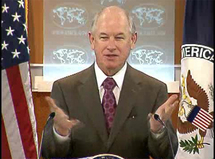US calls Palestinian counter-offer move in right direction
AFP
WASHINGTON- The United States on Wednesday welcomed a Palestinian counter-offer to Israel as a good step, but said such exchanges should be done in face-to-face negotiations rather than in public.
The Palestinians earlier Wednesday called on the US President Barack Obama's administration and Israel to define borders in response to Israel's demand for recognition as the Jewish state.

"But it also is a reminder of the limitation of... making offers and counter-offers by long distance through the media as opposed to sitting down face-to-face in a direct negotiation," he added.
"So this underscores exactly why we feel it is imperative for the Israelis and Palestinians to stay committed to direct negotiations."
Middle East peace talks launched in early September by Obama and US Secretary of State Hillary Clinton ground to a halt within weeks after the expiry of a 10-month moratorium on the construction of new Jewish settler homes.
Palestinian president Mahmud Abbas has refused to hold further negotiations while settlement construction in the West Bank continues and last week Arab League foreign ministers gave US negotiators a month to resolve the impasse.
When asked if Washington would help define borders, Crowley replied: "This is a core issue, and this is something that only a direct negotiation... can resolve."
On Tuesday Crowley asked the Palestinians to extend a counter-proposal to Israel's call for recognition as a "Jewish state" in exchange for a possible extension of restrictions on settlement building.
The Palestinians rejected the offer, saying recognition of Israel's Jewish identity had no relation to the peace process.
They instead demanded that the US administration set the 1967 lines as the starting point for negotiations about final borders.
In making the counter-offer, senior Palestinian official Yasser Abed Rabbo told AFP: "We officially demand that the US administration and the Israeli government provide a map of the borders of the state of Israel which they want us to recognize.
"We want to know whether this (Israeli) state includes our lands and houses in the West Bank and east Jerusalem," Abed Rabbo said, referring to Palestinian lands occupied during the 1967 Six Day War.
Israel has refused to withdraw completely from the occupied territories, insisting it will hang on to major settlement blocs as part of a land exchange and maintain a security presence in the Jordan Valley.
The Palestinians recognised Israel in the early 1990s but have adamantly refused to recognize it as a Jewish state for fear that doing so would prejudge the fate of Palestinian refugees from the 1948 Arab-Israeli war.
They also note that Arabs make up around 20 percent of Israel's population.
------------------------------------------------------------------------